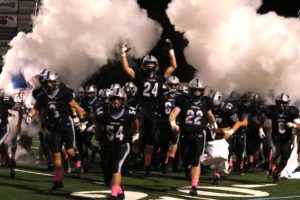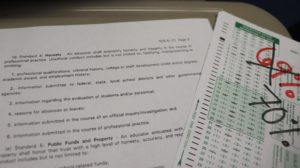College recruiting has no guidebook
Stanford women’s golf coach Anne Walker meets with student-athletes. Being recruited by a college coach requires more than athletic talent, which is why the recruiting process can be difficult and confusing without help.
November 14, 2017
Students can find outlines, textbooks, and guides for almost everything they will experience in high school, except being recruited by college coaches. Many athletes wonder if they should wait on coaches to find them, how to show their interest to coaches, and general information about the process of recruitment. The athletes need to answer all these questions while they are working on their game and their grades.
Student-athletes must consider not only the best school for their academic needs and expectations, but also the best team for their athletic career. It is important for students to choose a school and team that is the right fit for them. “Happy student-athletes who are comfortable where they are, are going to play better,” Rollins College’s women’s golf coach of 30 years Julie Garner said. Rollins has the most successful women’s golf program in NCAA history with 13 national championships.
This can be hard to do though, especially as a young student. That’s why coaches like Garner prefer talking to high school juniors and seniors that are looking at colleges.
“I just think this is most likely the biggest decision of your life up to this point […] I want the player to have all the time, space, growth, and maturity that they need to really get behind their decision,” Garner said. It is not uncommon to see 9th or even 8th graders talking to college coaches today. While some coaches recruit young student-athletes, many agree that it is hard for a kid of such age to know who they are as a person and what they want in life.
However, it is understandable why some student-athletes commit to a college early. Coaches want to lock in recruits and parents want to make sure their kids are going to get a full athletic scholarship to their dream school. Plus, there is a lot of pressure and money in this decision. “If a school wants you badly enough, they’ll wait,” Garner said. Waiting is not a bad thing. It gives the student and the coach more time to know each other and discuss mutual goals.
Along with finding a school and team that best fits them, recruits should keep in mind that they need to form a relationship with the coach of the school they are interested in. This is important for both parties because the students need to know if the coach and school fit their expectations, while coaches have expectations of their own they want to check. Forming this relationship can be difficult the first few times. That’s why there are businesses that strive to help student-athletes in the college recruiting system. These businesses offer recruiting counselors such as Brandi Jackson, a former professional golfer.
The thing to remember with recruiting services is that coaches often do not want to hear from the counselors. “The coaches want to hear directly from the player they may be recruiting, not from someone the player’s family paid,” Jackson said. That is why Jackson tries to avoid being the middle-man between players and coaches. Instead, she helps student-athletes by showing them how to reach out to coaches, ask the right questions, and be less dependent on their parents.
Jackson emphasizes the importance of independence and maturity for student-athletes looking to be recruited by a college coach. “Skill depends on the division of the school they want to go to, but maturity is necessary everywhere,” Jackson said. Student-athletes need to know how to pack for a trip, do laundry, exercise, and keep up with their diet. They also need to know how to balance school and sport. That is something that will differ between students.
“You can’t say what works best for one person will work for another person,” Garner said. Every person works differently, making it important for student-athletes and coaches to meet each other in the middle. That is why there is no guidebook for the college recruiting process.








